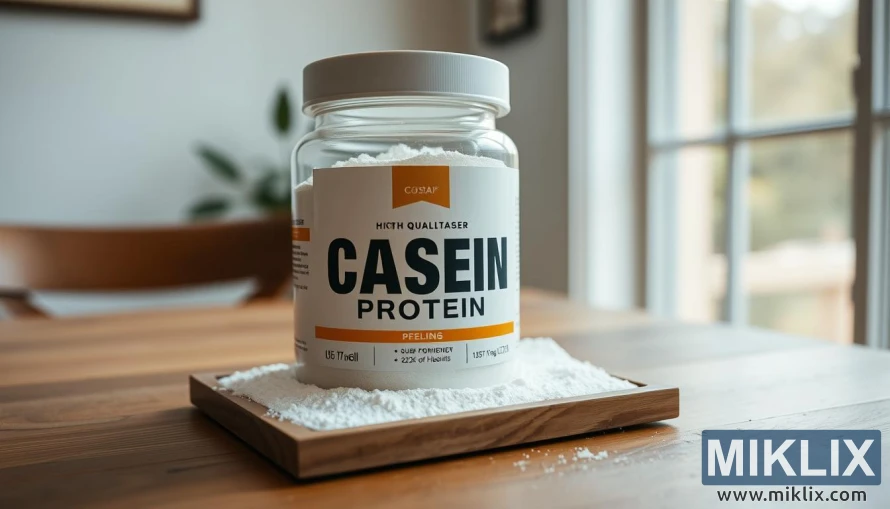Casein Protein: The Slow-Release Secret to All-Night Muscle Repair and Satiety
Published: June 18, 2025 at 8:38:42 AM UTC
Casein protein, derived from dairy, has become a focus for its health advantages. Its slow digestion rate ensures a steady release of amino acids. This makes it a top pick for muscle recovery and growth. Unlike quick-acting whey, casein provides a prolonged nutrient supply to muscles. This article explores how adding casein protein supplements to your diet can boost muscle recovery. It also promotes overall health and aids in effective weight management.

Key Takeaways
- Casein protein offers sustained amino acid release, aiding muscle recovery.
- It provides various health benefits suitable for athletes and fitness enthusiasts.
- Casein protein can support weight management strategies effectively.
- Incorporating casein protein into your diet can improve overall health.
- Choosing high-quality protein supplements is vital for maximizing benefits.
Understanding Casein Protein
What is casein protein? It's a major protein found in cow's milk and other mammals' milk, making up about 80% of milk's protein. This protein is a key component in dairy products like cheese and yogurt. Registered dietitian Elyse Homan notes its role in muscle repair and boosting the immune system.
Casein protein's benefits go beyond muscle growth. Its unique gel-like formation in the stomach leads to a slow release of amino acids. This slow digestion supports muscles over time, making it great for nighttime or long meal gaps.
Knowing about casein and other proteins is key for good nutrition. Adding casein to your diet can boost protein intake, helping those who exercise regularly or do strength training.
Casein Protein vs. Whey Protein
Understanding the differences between casein and whey proteins is key for those aiming to enhance their nutrition. Both are complete proteins, containing all essential amino acids. They contribute to muscle protein synthesis and overall health. The main difference lies in their digestion rates.
Casein protein is known for its slow digestion rate. This slow absorption ensures a steady release of amino acids into the bloodstream. It promotes long-term satiety and muscle maintenance. Athletes often consume casein before bed to aid in recovery during sleep.
Whey protein, in contrast, is absorbed quickly. This makes it perfect for immediate post-workout recovery. Its rapid digestion delivers amino acids to muscles when they need them most. It effectively supports muscle repair and growth after intense activity.
In a protein comparison, it's evident that each type has its own benefits. Depending on fitness goals and dietary preferences, either casein or whey protein can be beneficial. They both play a role in a balanced nutrition plan.
Benefits of Casein Protein for Muscle Recovery
Casein protein is a game-changer for muscle recovery thanks to its slow-release properties. This slow digestion ensures a steady flow of amino acids for hours, making it perfect after intense workouts. Adding casein protein to your post-workout routine helps your muscles get the nutrients they need to heal.
Studies show that taking casein protein before bed boosts protein levels at night, aiding in muscle recovery. This is key because sleep is when your body heals and grows. It efficiently uses amino acids. Some key casein protein benefits include:
- Continuous amino acid delivery which aids in muscle repair.
- Enhanced preservation of muscle mass during rest periods.
- Improved recovery times and reduced muscle soreness.
Combining slow absorption with nighttime consumption amplifies casein's muscle recovery benefits. It's a smart choice for athletes and fitness enthusiasts aiming to boost their performance and recovery.

Casein Protein and Muscle Growth
Casein protein is a key player in muscle growth, vital for bodybuilders. It's packed with leucine, a critical amino acid for muscle repair and growth. This makes it a must-have in an athlete's diet.
Pairing casein with resistance training boosts muscle development. Despite its slower digestion compared to whey, research shows it can be just as effective. Taking casein before bed or after workouts ensures a steady flow of amino acids.
For serious athletes aiming for muscle growth, adding casein to their daily regimen is beneficial. Its slow digestion provides a prolonged release of amino acids. This supports muscle repair and growth for hours.
Weight Management and Casein Protein
Adding casein protein to your diet can significantly aid in weight management. This slow-digesting protein type helps keep you full for longer, aiding in appetite control. It can also help in reducing overall calorie intake, which is key for those trying to manage their weight.
Studies show that eating casein protein before meals can lead to less food consumption. This is compared to other proteins or no protein at all. This makes casein protein a great choice for those looking to lose weight or maintain a healthy weight.
- Casein protein supports steady amino acid release.
- Benefits include fewer hunger pangs over time.
- Potential to encourage healthier food choices at meal times.
Protein supplements, like casein protein, are vital for effective weight management. For those seeking a balanced approach to health and fitness, incorporating casein into daily routines can lead to positive outcomes.
Casein Protein for Athletes and Bodybuilders
Athletes and bodybuilders can greatly benefit from adding casein protein to their diets. This slow-digesting protein helps preserve muscle during extended periods without food, like overnight. It's essential for those with demanding training schedules, as it aids in meeting protein needs.
Here are some ways casein protein aids athletes and bodybuilders:
- Promotes muscle recovery after rigorous workouts.
- Helps maintain lean muscle mass.
- Provides a steady release of amino acids, reducing muscle breakdown.
- Supports optimal performance during training sessions.
Integrating casein protein into daily nutrition plans is straightforward. Timing is key, like consuming it before bed. This ensures the body gets vital nutrients during rest. This approach is perfect for bodybuilders, helping them reach their fitness goals.

Calcium and Nutrient Density in Casein Protein
Casein protein stands out as a top-notch protein source, boasting a high calcium content. It offers nearly half of the daily calcium intake in certain supplements. This is a major plus for those aiming to increase their nutrient levels. The calcium it contains is vital for the body's functions.
Calcium is key for bone health, muscle function, and vascular systems. Adding casein protein to your diet boosts nutrient density effectively. Its benefits go beyond muscle repair and growth. It also aids in improving bone density and lowering osteoporosis risk.
Opting for casein protein supplements is a wise choice for fitness buffs and those looking to boost their nutrient intake. It offers a wealth of health advantages.
How to Incorporate Casein Protein into Your Diet
Adding casein to your diet can significantly boost your protein intake. It's available in many dietary sources, making it easy to include in your meals. Dairy products like milk, yogurt, and cheese are great options.
Protein shakes are another effective way to get casein. You can use micellar casein, which blends well into smoothies or shakes. This method provides a quick protein boost anytime. Trying different recipes can make it more enjoyable and ensure you benefit from casein.
Here are some ideas for incorporating casein into your meals:
- Mix casein powder into oatmeal or cereal for a filling breakfast.
- Blend casein into your favorite smoothie for a creamy texture.
- Bake with casein in recipes like protein bars or pancakes.
Exploring different ways to consume casein can make it a staple in your diet. This not only aids in muscle recovery but also enhances your overall nutrition.
The Role of Casein Protein in a Balanced Diet
Casein protein is vital for a balanced diet. It helps meet daily protein needs, essential for nutrition and health. Unlike fast-digesting proteins, casein breaks down slowly. This slow digestion releases amino acids over time, aiding in muscle recovery and growth.
Adding casein protein to meals is simple. It fits well in:
- Breakfast smoothies
- Protein shakes before bed
- Snacks or baked goods
This flexibility makes it easy to enjoy casein's benefits all day. For a well-rounded diet, mix casein with other proteins like whey or plant-based options.

Side Effects and Considerations of Casein Protein
Casein protein is widely recognized for its benefits. Yet, it's important to acknowledge the side effects it can cause. Those with a milk allergy should steer clear of casein, as it can lead to allergic reactions. These reactions can vary from mild symptoms like hives to severe anaphylaxis.
Casein also contains some lactose, albeit less than other dairy products. This can be problematic for those with lactose intolerance. They might experience discomfort, such as bloating or gastrointestinal distress, after consuming casein protein. It's vital for anyone considering supplementation to consult with a healthcare provider.
The Science Behind Casein Protein Supplements
Casein protein research uncovers fascinating insights into its benefits. It's known for its slow digestion, which leads to a steady release of amino acids in the blood. This slow release is key in protein metabolism, aiding in muscle repair and growth over time.
Scientific studies show that casein boosts muscle recovery. Those who took casein reported better recovery than those on faster-digesting proteins like whey. The steady flow of amino acids supports muscle protein synthesis, essential for athletes and fitness enthusiasts.
Casein protein may also affect appetite. Its slow digestion can lead to feelings of fullness, aiding in weight management. As more evidence supports its benefits, casein protein supplements are becoming more popular. They are sought after by those aiming to enhance their diet.
Choosing Quality Casein Protein Supplements
When selecting quality casein supplements, several key factors come into play. First, look for products with protein certification. This certification shows that the supplement has been tested for purity and potency. It ensures that consumers get a product that meets specific standards for effectiveness.
Conducting a thorough label review is critical when choosing casein protein. Pay attention to the protein content per serving and any additional nutrients like calcium. These nutrients enhance the overall benefits of the supplement. It's also important to check that ingredients are clearly listed, with no unnecessary fillers or additives.
Consider the source of casein in the product as well. Milk-derived casein is known for its quality. Vegan options may not offer the same benefits. Always verify any certifications relevant to dietary preferences, such as non-GMO or gluten-free.

Personalizing Your Casein Protein Intake
Customizing your casein protein intake is key to achieving your fitness goals. Your individual protein needs depend on several factors. These include your fitness objectives, age, activity levels, and health status. Understanding these factors helps in creating a diet tailored to support muscle repair and growth effectively.
Seeking advice from nutrition experts can offer valuable insights into your protein needs. They can craft a plan that fits your lifestyle and goals perfectly. For example, athletes and bodybuilders might need more protein, while those focusing on weight management might prefer a balanced approach.
- Evaluate fitness goals: Determine whether your focus is muscle growth, recovery, or weight management.
- Assess activity levels: Active individuals need more protein compared to those with a sedentary lifestyle.
- Consider age and health conditions: Older adults often have different protein needs than younger individuals.
By tailoring your casein protein intake, you boost its effectiveness and support long-term health. Remember, everyone's path to optimal health is unique. Embrace the customization that best suits your needs.
Practical Tips for Using Casein Protein
To fully harness the benefits of casein protein, consider these practical tips for casein implementation into your routine. Timing is essential; incorporating casein protein into your diet before sleep or after workouts helps with muscle recovery and growth.
For effective protein preparation, mix casein with sufficient liquid. This ensures a smoother consistency, preventing an unappetizing thick texture. Popular choices include milk, water, or a non-dairy alternative.
Enhance the nutritional profile of your casein intake by combining it with wholesome foods. Add fruits, nuts, or oatmeal to your protein shake, turning it into a balanced snack or meal replacement.
- Keep a scoop of casein protein handy for easy access.
- Experiment with flavors to find combinations you enjoy.
- Stay mindful of your overall calorie intake for balanced nutrition.
Follow these usage guidelines to maximize the benefits of casein protein. Your body will appreciate the thoughtful approach to nutrition.
Conclusion
The benefits of casein protein are vast, making it a key component in many diets. It offers significant health advantages, such as aiding in muscle recovery after exercise and supporting weight management. Its slow digestion ensures a steady release of amino acids, vital for athletes and those who are physically active.
Understanding how to incorporate casein protein into your diet is essential. This knowledge allows individuals to align their intake with their health objectives. By doing so, they can improve their overall well-being and enhance their fitness results.
For athletes seeking to boost their performance or individuals looking to manage their weight, casein protein is a game-changer. It empowers users to make healthier lifestyle choices, leading to better outcomes.
Further Reading
If you enjoyed this post, you may also like these suggestions:
- Unlocking Vitality: The Surprising Benefits of Co-Enzyme Q10 Supplements
- Cashews Uncovered: The Tasty Way to Boost Your Well-Being
- Eat More Blackberries: Powerful Reasons to Add Them to Your Diet
